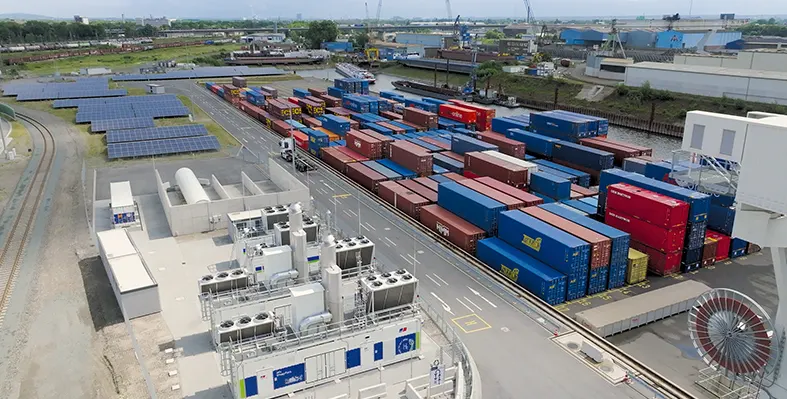African Review has obtained images from the new industrial power plant recently supplied to Danone South Africa by Clarke Energy
Commissioned at the end of last year, the facility is now working to power the food giant’s dairy production site in Anderbolt, Boksburg, providing a resilient, grid-connected microgrid solution that embraces a mix of energy systems and technologies.
The project was delivered in partnership with Austrian power generation firm, INNIO Group, and Moshesh Partners, a Johannesburg-based investment fund manager focused on clean energy and infrastructure work.
Clarke Energy delivered the system as a turnkey EPC (engineering, procurement and construction) project, integrating a new INNIO Jenbacher gas-fired combined heat and power (CHP) plant with the site’s existing solar PV installation and diesel backup generators to create what it called a “flexible and robust” energy solution.
The facility utilises two Jenbacher J616 containerised engines and the Jenbacher microgrid controller, providing a total capacity of 5 MWe.
Clarke Energy is an authorised distributor for INNIO’s Jenbacher engines.
Managed by an advanced microgrid controller, the system dynamically balances energy sources based on cost, availability and sustainability – ensuring continuous optimisation around the clock, according to a Clarke Energy statement.
“The microgrid significantly enhances energy resilience, protecting operations from frequent voltage dips and outages in the municipal supply, and enabling uninterrupted 24/7 dairy production,” it noted.
As South Africa’s leading producer of fermented dairy products, Danone also benefits from a more efficient and secure energy supply at a time when power outages have undermined industrial output and economic activity at a national level.
When the project was first announced in late 2023, a Danone executive said the Jenbacher microgrid solution would empower the company to become independent from the electricity grid supply.
It would also allow it to integrate a broad selection of distributed energy resources (DERs), such as renewables and storage devices, while ensuring business continuity, INNIO’s president and CEO Dr. Olaf Berlien noted.
The Jenbacher engines are operating on natural gas but can be converted to hydrogen as soon as sufficient hydrogen is available, Berlien added.
Due to insufficient power-generation capacity, there is “significant interest” in decentralised CHP engine plants, according to an INNIO statement.
The instability of South Africa’s grid, the ambition to reduce carbon emissions and the proposed return on investment motivated Danone to drive energy efficiency with CHP technology while producing distributed power and heat for their industrial process, it added.
Designed with hydrogen-readiness in mind, the power plant solution delivers a 50% reduction in Scope 1 and 2 emissions, aligning with Danone’s own Impact Journey, and represents a major step towards its 2050 net-zero target.
Read more:
Cooper LPG gensets bound for Africa market
Bankan Gold HFO power project emerges
Africa's off-grid power a 'missed opportunity' for investors
Kohler power businesses rebrand as Kohler Energy






















